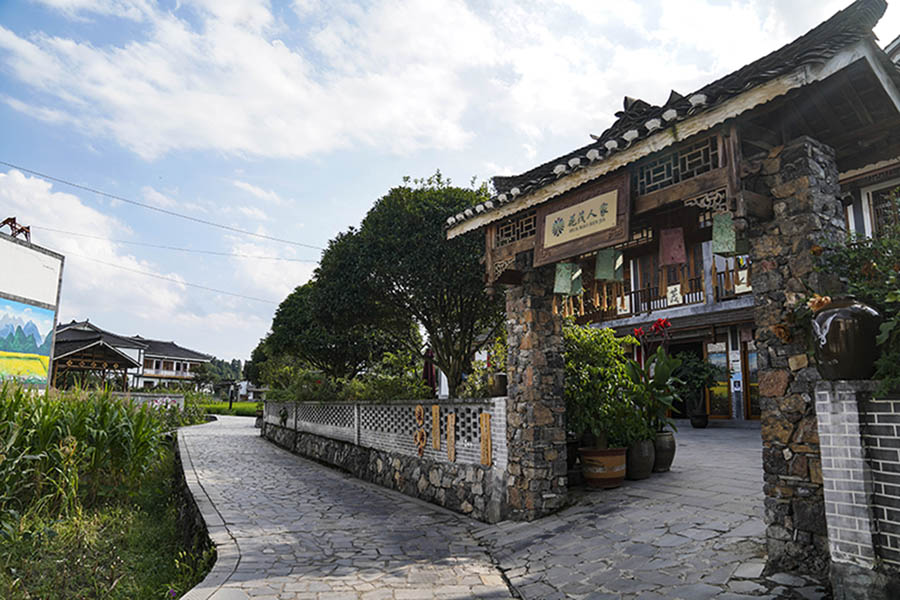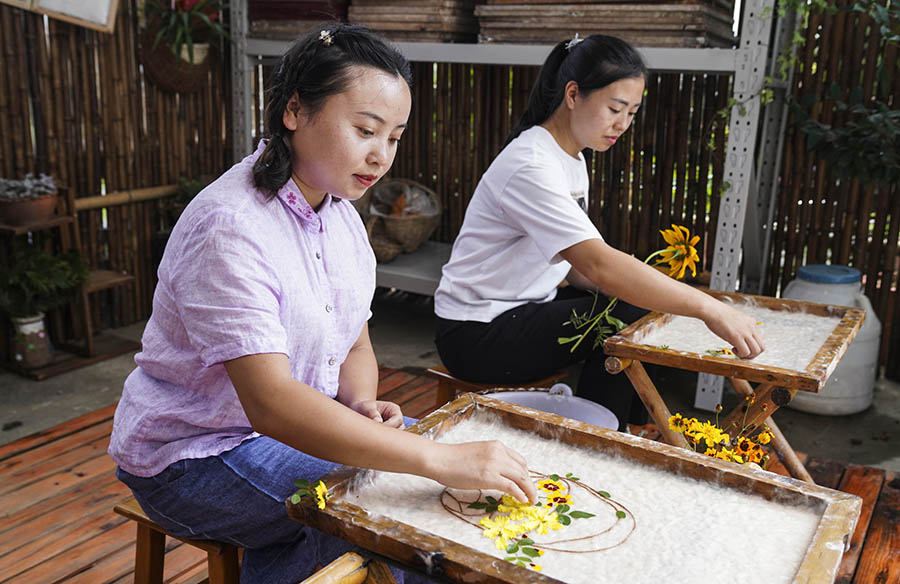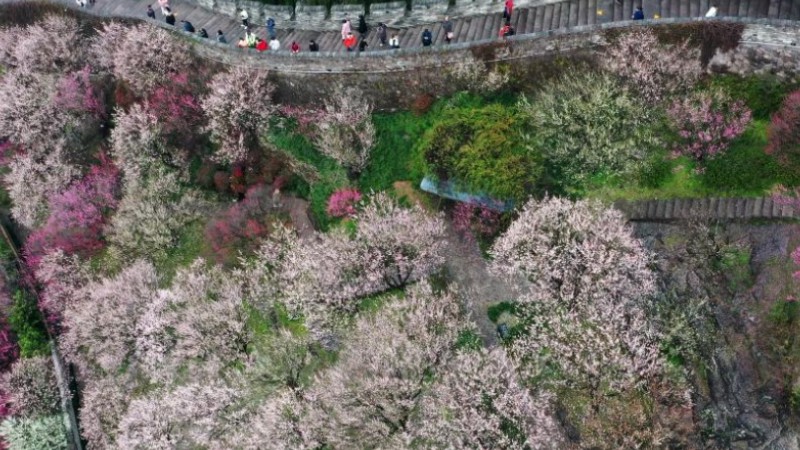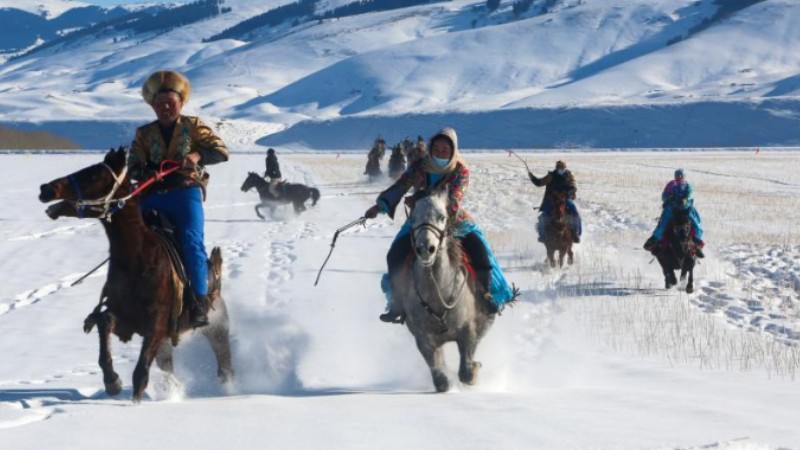Nostalgia and vitality merge in small village in SW China's Guizhou
Lush mountains, lucid waters, and neat traditional dwellings constitute a picturesque view for anyone to behold. Here, at Huamao village in southwest China's Guizhou Province, Chinese President Xi Jinping found nostalgia.
During his visit to the small village located in Fengxiang township of Zunyi city on June 16, 2015, President Xi said "No wonder so many people come here. Their homesickness is relieved here."
Xi’s words made Zhang Shengdi, a local entrepreneur who previously left the village for work, feel quite nostalgic for her hometown. She finally decided to go back to do something for her fellow villagers.
In 2016, Zhang started a papermaking workshop called Huamao Renjia, which literally means "households of Huamao," to revive a kind of traditional papermaking technique that involves boiling the bark of mulberry trees, one of the traditional handicrafts found in Huamao village. The production of paper using this ancient technique includes more than 70 steps and takes 49 days for the final product to be fully prepared.

Photo shows Huamao Renjia (“Households of Huamao”), a papermaking workshop in Huamao village, Zunyi city, southwest China’s Guizhou Province. (People’s Daily Online/Peng Yukai)

Zhang Shengdi, founder of Huamao Renjia (“Households of Huamao”), poses for a photo at her papermaking workshop in Huamao village, Zunyi city, southwest China’s Guizhou Province. (People’s Daily Online/Peng Yukai)
Zhang has injected new vitality into the ancient craft by introducing papermaking artwork made with flowers and leaves while diversifying the products made using paper, including fans, bookmarks, and notebooks, which have been well received by tourists.
“The new rural construction should conform to the reality and law of development in rural areas. The rural flavor and landscape should be retained, and the natural environment and local culture protected,” Xi said.
Zhang’s papermaking workshop and Huamao village vividly epitomize Xi’s vision for rural construction.
For Zhang, the lush mountains and lucid waters in her hometown have provided her with a sense of comfort and security. It's like "a baby nestling in her mother's arms," she said. It’s the power of nostalgia that drove her to revive the ancient papermaking craft in her hometown. Zhang is deeply impressed by the fact that her fellow villagers have a greater sense of happiness.

Photo shows a house with a mural painted on the wall in Huamao village, Zunyi city, southwest China’s Guizhou Province. (People’s Daily Online/Peng Yukai)

Photo shows the scenery of Huamao village, Zunyi city, southwest China’s Guizhou Province. (People’s Daily Online/Peng Yukai)
Formerly known as "Huangmaotian," which literally means a desolate and barren place, Huamao used to be a village that faced difficulties in developing agriculture and ensuring stable employment. It also suffered from poor transportation. The village had more than 4,000 villagers, but over 2,000 of them left to look for jobs elsewhere.
Huamao village is now full of vitality. It is home to seven rural hotels, 13 agritainment facilities, a pottery-themed street, and some cooperatives. Last year, the village attracted more than 880,000 tourists, and with the per capita disposable income of villagers having meanwhile reached 21,864 yuan (about $3,181.7).
Like Zhang, many young people have returned to their hometowns in search of nostalgia. Employees working at Zhang's workshop include Luo Jiyan, who was once a migrant worker, and Kuang Tingting, a returning college graduate.

Kuang Tingting (L), a returning college student, and Luo Jiyan, a returning migrant worker, make handicrafts at Huamao Renjia (“Households of Huamao”), a papermaking workshop in Huamao village, Zunyi city, southwest China’s Guizhou Province. (People’s Daily Online/Peng Yukai)
Witnessing the thriving rural tourism industry in the village, Luo began to learn the ancient papermaking technique at Zhang’s workshop two years ago. Luo said she cherished the opportunity to learn skills and make money near her home while taking care of her children. More importantly, at the workshop, she has the ambition to carry forward the ancient papermaking craft.
Kuang, from a village near Huamao village, worked in a city after she graduated from college in 2018. “Back then, I always felt that I lived a rootless life. Coming to Huamao village feels like home,” Kuang said. She hopes to help an increasing number of villagers build up cultural confidence and advance rural vitalization in her hometown.
Xi stressed the need to strengthen top-level design, adopt more vigorous measures and pool more strength to advance rural vitalization, a task no less challenging than poverty alleviation. Huamao village serves as a vivid example of China's efforts to boost rural vitalization.
Photos
Related Stories
- Xi meets Cambodian PM Hun Sen
- Xi encourages Chinese medical personnel in Africa to deliver benefits to locals
- Well-protected historical and cultural block preserves nostalgia for locals in China's Fujian
- Renovated Beijing hutongs shine with ancient charm
- Xi stresses grasping, advancing Chinese modernization
Copyright © 2023 People's Daily Online. All Rights Reserved.









